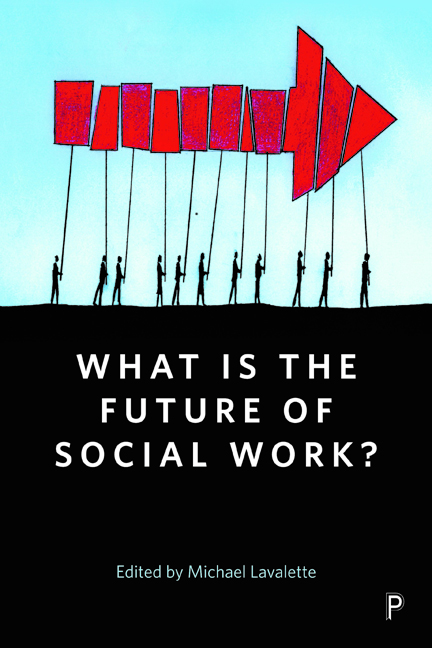Book contents
- Frontmatter
- Contents
- List of Figures and Tables
- Notes on Contributors
- Editor’s Acknowledgements
- Foreword
- Introduction: What is the Future of Social Work?
- 1 Austerity and the Context of Social Work Today
- 2 Contemporary Developments in Child Protection in England: Reform or Reaction?
- 3 The Slow Death of Social Work with Older People?
- 4 Mental Health Social Work: The Dog that Hasn’t Barked
- 5 Learning Disabilities and Social Work
- 6 Social Work by and for All
- 7 Anti-Oppressive Social Work, Neoliberalism and Neo-Eugenics
- 8 From Seebohm Factories to Neoliberal Production Lines? The Social Work Labour Process
- 9 Social Work and the Refugee Crisis: Reflections from Samos in Greece
- Conclusion: The Road to an Alternative Future?
- References
- Index
4 - Mental Health Social Work: The Dog that Hasn’t Barked
Published online by Cambridge University Press: 03 March 2021
- Frontmatter
- Contents
- List of Figures and Tables
- Notes on Contributors
- Editor’s Acknowledgements
- Foreword
- Introduction: What is the Future of Social Work?
- 1 Austerity and the Context of Social Work Today
- 2 Contemporary Developments in Child Protection in England: Reform or Reaction?
- 3 The Slow Death of Social Work with Older People?
- 4 Mental Health Social Work: The Dog that Hasn’t Barked
- 5 Learning Disabilities and Social Work
- 6 Social Work by and for All
- 7 Anti-Oppressive Social Work, Neoliberalism and Neo-Eugenics
- 8 From Seebohm Factories to Neoliberal Production Lines? The Social Work Labour Process
- 9 Social Work and the Refugee Crisis: Reflections from Samos in Greece
- Conclusion: The Road to an Alternative Future?
- References
- Index
Summary
Introduction
More than 60 years have now passed since the publication in the USA of The Sane Society by Marxist psychoanalyst Erich Fromm (1955/2001). Fromm's main argument in that book was that in promoting the idea that the road to happiness and fulfilment lay in consumerism, in persuading people to conform to a very narrow conception of ‘the good life’, and in encouraging people to deny their real needs and feelings, American society in the 1950s was actually creating mental ill-health. Far from being a ‘sane society’, it was in fact an ‘insane society’. Consumer capitalism, Fromm argued, was making people ill.
The book struck a massive chord and within weeks of its publication was fifth in the New York Times bestseller list. Since that time, it has sold more than 3 million copies.
Following Fromm, the central argument of this chapter will be that the world in which we live today – the world of neoliberal global capitalism – is also creating mental ill-health on an industrial scale. Three examples will illustrate the point. Firstly, according to the World Health Organisation, depression now affects over 300 million people worldwide and is the leading cause of disability in the world (WHO 2017). As George Brown and Tirril Harris argued some 40 years ago in their classic study of depression in women, while sadness, unhappiness and grief are inevitable in all societies, the same is not true of clinical depression (Brown and Harris 1978/2011). Rather, depression on this scale tells us something about the nature of the society we live in.
Then there is the current epidemic of loneliness. Neoliberalism, the ideology that preaches individualism and claims that ‘there is no such thing as society’, has contributed to a situation where loneliness and social isolation are having a devastating effect on the lives and health of both young and old people. According to research conducted by Age UK in 2014, for example, more than 80,000 people aged 65 and over living in Scotland said they always or often felt lonely (Davidson and Rossall 2014). Across the UK the figure was more than a million. Loneliness in itself of course is not the same as mental ill-health and there can be definite mental health benefits to solitude.
- Type
- Chapter
- Information
- What Is the Future of Social Work? , pp. 57 - 68Publisher: Bristol University PressPrint publication year: 2019



